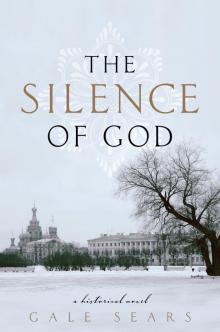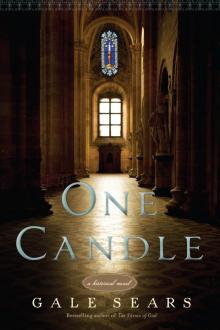- Home
- Gale Sears
The Silence of God Page 7
The Silence of God Read online
Page 7
“But you don’t believe in the Bible.”
“As a holy book, no. But it still contains some very beautiful words. Now, let us get home before your mother worries herself into sickness.”
Natasha smiled and leaned against her father’s shoulder.
In another part of the city, the jubilant convoy of revolutionaries had reached the Smolny Institute, headquarters for the Bolshevik Committee.
Vladimir Ilyich Lenin had come home.
Notes
1. Sergey’s toast to the Tsarevitch Alexis—that the young man should marry a butcher’s daughter and work with knives all his life—is especially cruel in light of Alexis’s hemophilia. He suffered from the painful illness all his life.
2. The character of Dmitri Borisovitch is patterned after an actual person, Dziga Vertov. Dziga Vertov was a young filmmaker in Russia who pioneered forms of documentary film. He was recruited by Lenin to use the artistry of filmmaking to advance the Soviet Socialist ideology through propaganda.
3. Izba: a traditional Russian countryside dwelling similar to a log cabin.
4. Proletariat: The class that lives by selling its labor.
5. Soviet: a council of workers.
6. White nights: Because St. Petersburg is situated only six degrees of latitude south of the Arctic Circle, from mid-May to mid-July twilight never gives way to night. The Russians refer to this time as “the white nights.”
7. Lenin’s arrival at the Finland Station in Petrograd was greeted with a mixture of euphoria and distrust. Many of the more strident proponents of socialism were emboldened with his arrival. Other, more moderate-minded constituents worried that Lenin and his company had come from exile in Switzerland on a secret train supplied by the German government. They wondered about the harsh reparations Germany might impose for Russia’s capitulation. Indeed, Lenin had made it clear that if the Bolsheviks were to come to power, they would end Russia’s involvement in the Great War. Germany was counting on this eventuality, because it would release their forces on the Eastern Front, which could then be deployed to the Western Front. Many in the Provisional Government feared that Lenin would shred the fragile thread of power they’d established after overthrowing the tsar. Indeed, Lenin himself fully expected the Provisional Government to arrest him upon his arrival in Petrograd.
8. The socialist revolution in Russia was not meant to be an isolated event. The Bolshevik leaders were convinced that when other socialist movements in Europe and America saw the success of the Bolshevik takeover in Russia, they would follow suit. That was the dream of the socialists—a worldwide proletariat dictatorship.
9. Peter and Paul Fortress: Peter the Great built a walled encampment in 1703 on Zayachy Island to protect the city of St. Petersburg. Within the walls of the fortress stand military buildings, the Church of Peter and Paul, and a prison.
Chapter Five
Petrograd
August 1917
“You will never guess what Mother and I saw today when we were shopping, Natasha Ivanovna.”
Natasha grinned at Agnes’s bright expression. “I can’t imagine.”
“Dog collars!”
“Dog collars?”
“Yes. It was so odd. All along the Nevsky Prospect there were closed shops, one right after another, and then here was this run-down little shop selling dog collars. Some of the collars were studded with small jewels.”
Natasha Ivanovna scoffed. “Such a waste. The shop owner will have a hard time selling those. Who would be bourgeois enough to have a dog these days, anyway? No one. That’s probably why he had something to sell, because no one has a dog.”
Agnes grunted. “You are so tiresome, Natasha Ivanovna. Let’s not talk anymore. I say we pay attention to the soup and bread, and not talk about anything.”
The women stood in the Lindlof kitchen, chopping vegetables for the evening meal of borscht.
“But don’t you see how much better life will be under Communism? We are Russian, Agnes. We are not British or American. We know how to share. The ancient peasant ideology of sharing will slide easily into Communism.”
“Must we talk politics?” Agnes protested, cutting through the head of cabbage with one stroke. “That’s all you want to do anymore, Natasha Ivanovna—talk politics.”
Natasha opened her mouth to share another opinion, then relented. “I’m sorry, little squirrel. I won’t say another word.”
They chopped in silence, adding to the colorful piles of thin strips of cabbage, carrot, beet, potato, and onion that waited for the soup pot. The dark brown dough of peasant bread was rising on the sideboard, and golden summer pears filled a bowl on the table. Even with Agnes’s two brothers away at war, Natasha was amazed at the amount of food needed to feed so many mouths. Agnes’s father still found places to sell his gold and silver trinkets, a fact that Natasha found disconcerting. Russian soldiers were starving on the front lines, factory workers existed on bread alone, and the country farmers were forced to send the bulk of their harvest to the cities. Yet, with the earth crumbling around them, the upper class still had lavish parties, went to the theater, and purchased silver wine goblets to toast their own good health. She shook her head and chopped vegetables.
“What?” Agnes asked.
“Nothing,” Natasha said flatly, placing beets on the beet stack.
“Natasha Ivanovna, we are closer than sisters. I know when something is on your mind.”
Natasha grinned. “No, I won’t say, because it’s politics again.”
“Ugh!” Agnes protested. “I’m glad you are done with the university.”
“Are you? Why?”
“Because they taught you only to think, think, think.”
Natasha laughed. “Yes, I suppose that is the purpose of education.”
Agnes picked up an onion and began peeling it. “Yes, but the Bolsheviks want us to only think their way. All these brilliant people running around insisting they can figure out the best way for people to live. Kerensky and the Provisional Government say this; Lenin and the Bolsheviks say that.”
Natasha nodded. “And the monks in the church chant prayers, while the war goes on and people are starving.”
“Politics again!” Agnes snapped, her eyes watering from the onion.
“Politics always, little squirrel,” Natasha said.
They worked without speaking for several minutes.
Agnes broke the silence. “Father says it won’t work.”
“What won’t work?”
“Communism.”
Natasha carefully chopped a carrot.
“He says that the ideas of the Socialists are flawed.”
Natasha worked to keep a sharp tone out of her voice. “Now who’s talking politics?”
“In our Church we have this law called . . .” Agnes stopped chopping and concentrated. “Oh, I can’t remember. The law of cons—of something.”
“It was called the law of consecration,” Johan Lindlof said, coming into the kitchen.
Agnes jumped. “Father! You frightened me.”
“Sorry, dear one. I only came in for a drink of water.” He moved to the sink. “How is the soup coming, Natasha Ivanovna?”
“Fine, sir. We’ve chopped half a garden’s worth and only have the other half to manage.”
Johan chuckled. “My wife is very grateful for your help.”
Natasha nodded. She knew that Agnes’s mother was often ill with worry over her two sons in the war.
“So, here you are, two intelligent girls, chopping vegetables and talking religion and politics.”
Agnes frowned. “I’m tired of talking politics. Everyone is always talking politics, or going on strike, or protesting.”
Natasha watched Mr. Lindlof’s face, but it was full of tenderness as
he set down his glass of water and gave his daughter a hug. “I know this is a hard time for you, my Agnes—conflict and upheaval on every side. Be patient. Trust God.”
Agnes nodded.
“I know Agnes won’t be pleased,” Natasha ventured, “but I would like to ask about this law of consecration, Mr. Lindlof.”
Johan searched the bright, inquisitive face of his daughter’s lifelong friend.
Natasha returned his look openly, realizing that he was assessing if her inquiry was genuine. She knew he found her family to be an enigma—affable toward their neighbors, yet holding themselves aloof. She knew her mother’s aloofness came because of her timid nature, but her father’s distance came because of philosophical differences with the Lindlofs concerning occupation, politics, and religion—basic differences which affability could not bridge.
Unadulterated affection had bonded her and Agnes through the years since their childhood, and she hoped that Mr. Lindlof would trust upon that bond to answer her question.
He sat down at the kitchen table. “What would you like to know, Natasha Ivanovna?”
“What is the law of consecration?”
“It’s a way of living. And when the law is lived properly it can lead to the total elimination of poverty.”
“Excuse me?” Natasha said, her knife held idle over the vegetables.
Mr. Lindlof smiled at her. “Yes, a lofty goal indeed.”
“An impossible goal.”
“Well, ancient scripture tells us that it has happened on a few occasions.”
Natasha’s intellect bristled at the mention of scriptural folklore, but she was intrigued by such sweeping economic claims.
“How does it work?”
“With great difficulty,” Mr. Lindlof answered. “It hasn’t been achieved for thousands of years.”
Natasha laid down her knife. “But your church practices this law?”
“Wait now, we’re getting ahead of ourselves. Let me start back a bit.” Mr. Lindlof hesitated, and Natasha surmised he was organizing his thoughts. She waited. “The law of consecration was received through revelation to the Prophet Joseph Smith,” Mr. Lindlof stated.
Natasha struggled to keep listening.
“I know this is difficult for you, Natasha Ivanovna, but see if you can pull anything interesting from my fairy tale of faith.”
Natasha found herself smiling. She glanced over at Agnes. “As long as you don’t try to tell me that story of gold bibles and angels.”
Johan Lindlof smiled with her. “No. We will have enough to consider with this topic.”
“So, what is it?”
“First let me ask if you’ve read Lenin’s newest writing—The State and the Revolution?”
Natasha stared at Agnes’s father as though she’d never seen him before. “I . . . I have. Have you?”
“Of course.”
Natasha came to sit with him at the table. “But you are not a Bolshevik.”
“No. But it is a foolish man who is not aware of the forces pressing in on his world.”
Natasha nodded.
“I found it fascinating that Lenin writes of a great utopian vision.”
Agnes put onions into the soup pot. “Utopian?”
“A perfect society,” her father said. “Lenin predicts that when the government of the common man sweeps away capitalism, then people will be transformed.”
“What do you mean?” Agnes asked as she brought the lump of dough to the table for kneading.
“Lenin doesn’t say how it will happen, he just says that man will no longer think in a selfish, capitalistic context, but in a new, brotherly communistic one.”
Natasha sat straighter. “That man will behave in a natural, ethical manner.”
“Yes,” Mr. Lindlof agreed. “That’s what Lenin believes. Marx had the same vague vision of what society would be like after the proletariat smashed the state machine. In the Manifesto, he expects the experience of the mass movement to show them the way to the next step.”
Natasha stiffened. “You don’t think their vision is possible?”
Johan looked at her straight on. “No. Neither Marx nor Lenin knows how this transformation will happen—how man will change from a selfish lout to a caring, hardworking comrade. They just believe that somehow it will.”
Natasha spoke slowly. “Well, the process will change them. As we move through this great journey of the proletariat, men will see the benefit of equality—of working together in a communal effort.” She looked again into Mr. Lindlof’s eyes. “You don’t believe that.”
“No. You cannot change a man’s nature or behavior by outside means, Natasha Ivanovna. There must be a change of a man’s heart, and only God can do that.”
“I don’t believe in God.”
“I know, and neither does Marx or Lenin. For them religion is to be purged from the system along with capitalism and class.”
“Religion is the opium of the people,” Natasha said, not looking at Agnes.
Johan smiled at her. “So I’ve heard.”
“But we are off the subject,” Natasha said. “I want to know why you think this law of yours will work and Socialism won’t.”
“But faith is the subject, Natasha Ivanovna. Faith is the difference between the two ideologies. It matters where you put your trust.” He turned to his daughter. “Agnes, will you please bring me my Book of Mormon and the new book Brother Hoglund sent me? They’re on my dresser.”
“Yes, Father.” Agnes finished kneading the bread and set it aside.
Natasha felt out of sorts and trapped. She did not want to hear anything from the strange Mormon books. She berated herself for asking about the stupid concept in the first place. She would have invented an excuse that her father needed her at home, but her parents were in Sel’tso Saterno visiting her mother’s sister. She wished she were with them in the country with her aunt and uncle and cousin Irena—anywhere but here listening to religious nonsense.
“The law of consecration says that a person is to consecrate all their time, talents, and earthly goods to the building of God’s kingdom.”
Natasha brought her full attention to the subject matter. “Your God certainly asks for much.”
“Actually He doesn’t ask it for Himself at all. We live the law for each other—to become one in heart and mind.”
Agnes returned and laid the books on the table.
“Thank you,” her father said, patting her hand.
“I thought you promised not to talk about gold bibles,” Natasha said.
Johan smiled. “Think of it as a history book.” He flipped pages in the black book until he found the place he wanted.
Natasha heard Agnes’s knife thunking on the wooden table and smelled the tang of onions simmering in the pot. Indulge him, she thought. How often had she indulged her mother’s empty rituals, watching with pity as she knelt in front of the small bedroom table covered with miniature icons, or when she wore her scarf embroidered with crosses out into public. Natasha turned her face toward Mr. Lindlof, her eyes devoid of interest.
“There was a group of people in ancient America that, because of faith, changed their hearts so completely that they lived in peace for a long time.”
Natasha set her jaw as he read.
“‘And they had all things common among them; therefore there were not rich and poor, bond and free, but they were all made free, and partakers of the heavenly gift.’” He turned the page. “‘And it came to pass that there was no contention in the land, because of the love of God which did dwell in the hearts of the people.’” He stopped reading and looked at her.
“For how long?”
“I beg your pardon?”
“How long did they live in peace?” Natasha asked.
> “Almost two hundred years.”
Natasha was shocked by that answer. “Two hundred years? I’ve studied a little about the ancient people of the Americas, but I’ve never heard of this.”
Johan Lindlof nodded. “I’m not surprised.”
“And you believe this folklore?”
Mr. Lindlof looked at her straight on. “Not folklore. I believe there actually was an ancient civilization that found a way to peace through living this law of consecration. From each according to their ability. To each according to their needs.”
“Those are the words of Karl Marx. No man above another—all men sharing.”
“Yes, but here is the difference. This consecrating of one’s time, talents, and all earthly goods is done voluntarily, Natasha Ivanovna. It is not mandated by government. And because men’s hearts are changed, they will not only share willingly, but they will not demand anything they do not deserve.”
Natasha felt a coil of resentment snake up her spine. She thought of the gold and silver which constituted the Lindlofs’ livelihood. “You don’t live your church’s law,” she said before she could temper the harshness of her tone. She sensed Agnes staring at her, and she felt the heat of shame rise into her face.
“No one lives the law at this time,” Mr. Lindlof answered without rancor. “The Prophet Joseph tried to prepare the people to live the law, but they could not move beyond their selfishness.”
“Men’s hearts again.”
Mr. Lindlof gave her a kind look. “Yes, men’s hearts again. We are asked to work hard and take care of our neighbors where there is need.” He picked up the other book that Agnes had brought out. “For now, we live the lesser law of tithing, but that is a story for another day.” He stood. “I must get back to the shop before Johannes and Oskar ruin the silver set we’re working on.” He held out the book to her. “I want you to have this, Natasha Ivanovna.”
She sat motionless, not wanting to be rude, but not wanting to take the book.
“It is not the golden bible,” he said gently. “It is a book I think you will find most interesting. Think of it as a philosophy book.”

 The Silence of God
The Silence of God Letters in the Jade Dragon Box
Letters in the Jade Dragon Box One Candle
One Candle